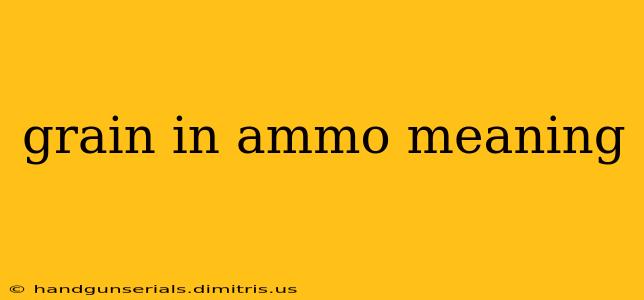The term "grain" in the context of ammunition refers to the weight of a projectile, typically a bullet, expressed in grains. One grain is equal to 1/7000 of a pound (approximately 0.0648 grams). Understanding grain weight is crucial for anyone involved in shooting sports, hunting, or simply interested in firearms. This weight significantly impacts several key aspects of a cartridge's performance.
Why Grain Weight Matters: A Deep Dive into Ballistics
The grain weight of a bullet directly influences its:
1. Ballistic Trajectory:
Heavier bullets (higher grain weight) generally have a flatter trajectory at longer ranges. This means they drop less over distance compared to lighter bullets of the same caliber. This is particularly important for precision shooting and long-range hunting where accuracy is paramount. However, heavier bullets also tend to have lower muzzle velocities.
2. Muzzle Velocity:
Muzzle velocity, the speed at which a bullet leaves the barrel, is inversely related to grain weight (for a given cartridge). Lighter bullets will generally achieve higher muzzle velocities, leading to faster target acquisition at closer ranges. However, this higher velocity might come at the cost of a less stable trajectory at longer distances.
3. Recoil:
Heavier bullets generally produce less felt recoil than lighter bullets, making them more comfortable to shoot for extended periods. This is because a portion of the recoil energy is transferred to the bullet itself. This reduced recoil can be beneficial for shooters with sensitivity to recoil or for those who prefer a smoother shooting experience.
4. Energy Transfer:
The energy a bullet carries upon impact depends on both its weight and velocity. While heavier bullets may have lower velocities, their greater mass can still result in significant energy transfer upon impact, making them effective for hunting larger game. Conversely, lighter, faster bullets might be suitable for smaller game where penetration needs are less demanding.
5. Penetration:
Bullet penetration is complex and depends on many factors beyond just grain weight, including bullet construction (jacketed, hollow point, etc.), velocity, and the material being penetrated. Generally, heavier bullets tend to penetrate deeper than lighter bullets, assuming similar construction and velocity.
Choosing the Right Grain Weight: Considerations for Different Applications
The optimal grain weight for a particular application depends on a number of factors, including:
- Caliber: Different calibers are designed to handle different grain weights effectively.
- Intended Use: Hunting, target shooting, self-defense, and other applications each have specific grain weight requirements to optimize performance. For instance, varmint hunting might favor lighter, faster bullets, whereas big-game hunting might benefit from heavier, more penetrating bullets.
- Barrel Length: Barrel length influences muzzle velocity and therefore the effectiveness of different grain weights.
- Personal Preference: Ultimately, the best grain weight is often determined by personal preference and experience.
Understanding the relationship between grain weight and ballistic performance is essential for selecting the right ammunition for your needs. This information empowers you to make informed decisions, ensuring accuracy, safety, and effectiveness in various shooting scenarios. Always consult relevant resources and safety guidelines when choosing and handling ammunition.

